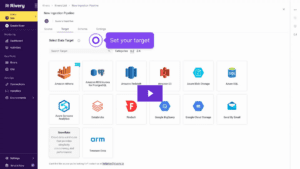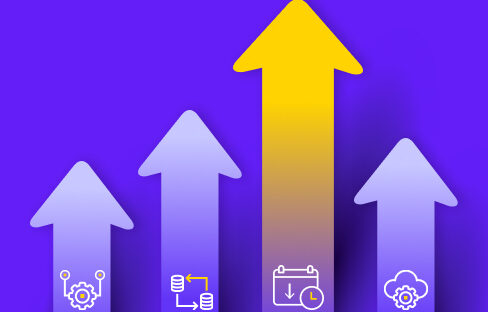I joined Rivery 2 months ago. During this short period, I’ve learned more than I could ever imagine about data processes – mostly about common myths and misconceptions companies have about data.
While every organization aims to be data-driven, in reality very few have managed to orchestrate a robust ecosystem.
This means having the right infrastructure to supports an operation that empowers teams and employees to make the most of their business insights.
5 of my biggest learnings:
1. Managing data badly will cost you a fortune in the long term
Many different data sources coming into play for most businesses – from marketing data, to product usage data, to operations data. If you don’t align and streamline all your data flows efficiently, the process of storing, processing, transforming and ultimately getting insights from your data could be an incredibly lengthy and expensive process. Automation is key.
The shift to the cloud has given companies unprecedented flexibility to scale and manage their data processes. In addition, visualisation tools such as Tableau and Looker help businesses customise their reports and dashboards to get straight to the KPIs that matter most to them.
Robust data orchestration and automation will give you the freedom to access insights when you need them most. Using the right tools and building an optimal data stack is the only way to make this operation financially viable.
Some people might see it as an expense but streamlining data orchestration processes will save your organization a lot of money right away. New tools like Rivery mean that any business can avoid the high development resources and maintenance costs associated with building, managing and maintaining your data pipelines.
2. You won’t be fully data driven until you have a single source of truth
Even the smallest companies face the issue of different data sources telling a different story. In global enterprise companies, the challenge intensifies. When data is managed and processed in silos, there isn’t a single source of truth that everyone can adhere to.
Centralizing data processes is essential for businesses to have coherent and consistent insights. In addition, the inefficiencies that derive from businesses managing data in silos can lead to millions of dollars wasted.
I see so much overspend in processing duplicate data sets, not sharing the same tools across teams, and having to spend countless hours trying to unify insights at a corporate level.
You can think of it as a ‘Tower of Babel’ scenario. While old habits die hard, companies need to invest in a centralized data hub. This will benefit everyone who interacts with it.
3. Data management isn’t a ‘one-off’ task but an ongoing process
Data isn’t a static entity but operates like a living organism. Because of this, data management processes aren’t something that once they’re established you can forget about. While it is true that establishing the right infrastructure for all your data isn’t something you will frequently change, there are always new data sources and insights being added to companies.
Maybe a new marketing campaign through an emerging social platform like TikTok? Or your support team is using a new platform to manage tickets? While there is a need to build a solid ecosystem, it also needs to have the flexibility to evolve and grow.
In addition to adding new sources or platforms, your objectives and KPIs will also evolve over time. Be prepared to create processes that are future-proof and ready to grow and evolve over time.
4. Data governance and compliance is relevant to every company
The words ‘governance’ and ‘compliance’ might sound scary and more fit for the legal team than for a data analyst. However, data orchestration and governance go hand in hand. Centralizing and establishing the right data processes means having your house in order.
On the one hand, it makes it easier to control and track what’s happening with data across the business. This includes looking into historical changes which might be useful during an audit.
Having a clear data ecosystem under control will save you time and money when your business needs to review data governance practices or audit existing processes.
5. If you don’t control data, data will control you
All your teams and employees rely upon data to a bigger or lesser extent to be able to thrive in their roles. Commercial teams, marketing teams, product teams, HR teams… nobody can really make informed decisions or prioritize their workload without access to the right data. Data teams are learning to be more proactive.
This includes automating the way data is processed and visualized, so they don’t have to reactively create reports or pull data every time a colleague needs new insights. Having control over data processes grants data teams the freedom to build data models that can be easily shared and updated. Making this shift is a game changer for any data team.
Of course these are only a few of the things I learned at Rivery, where we help companies every day streamline & automate the way in which they orchestrate and manage their data processes.
After speaking with many CTOs, CIOs, data analysts, and engineers – what makes me more excited is learning that this really isn’t rocket science. What’s more, new technologies mean that data teams no longer have to rely on developers to create and manage their data pipelines.
It’s a very exciting time for the data industry. With data management being democratized, soon any employee will have the autonomy to simply access what they need, whenever they need it. I’m looking forward to helping our clients across EMEA unlock their biggest challenges. We’re on a mission to empower teams with the tools the need to access and orchestrate data with unprecedented freedom and ease.
Salomé Laborde is Head of Sales for EMEA at Rivery, a SaaS ETL Management Platforms designed to help companies integrate, orchestrate and manage all their data efficiently. Prior to that, Salome has worked in various commercial roles across multiple tech verticals including delivery logistics platform Bringg and crypto-compliance at Solidus Labs. Salome is a graduate from the University of Auckland and holds a Masters Degree from EM Lyon Business School & Central Lyon.
Minimize the firefighting. Maximize ROI on pipelines.





